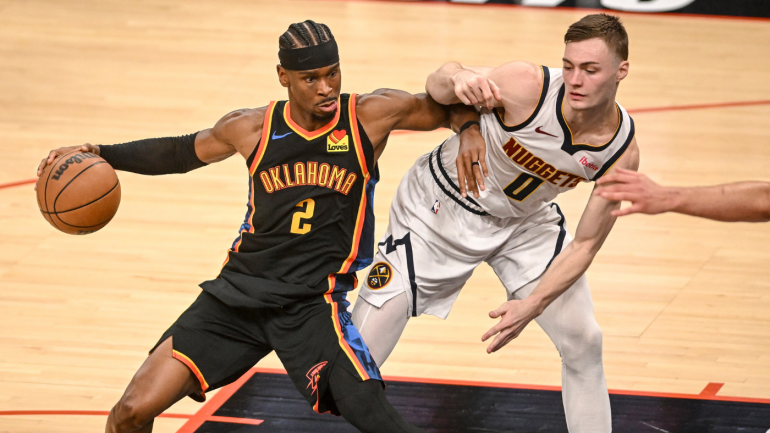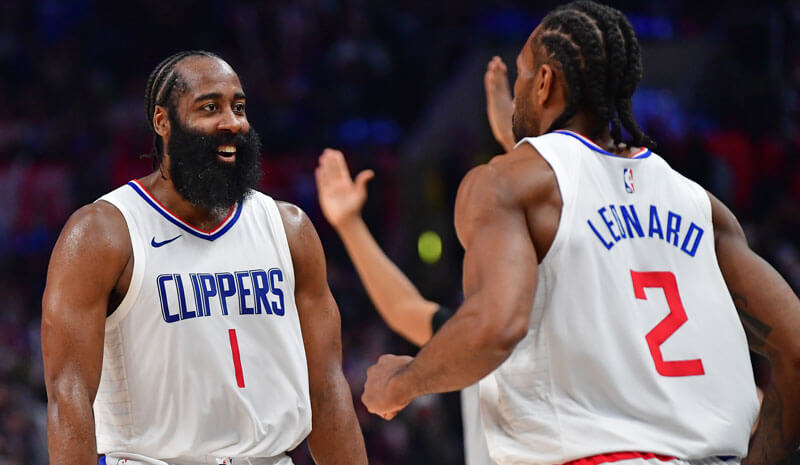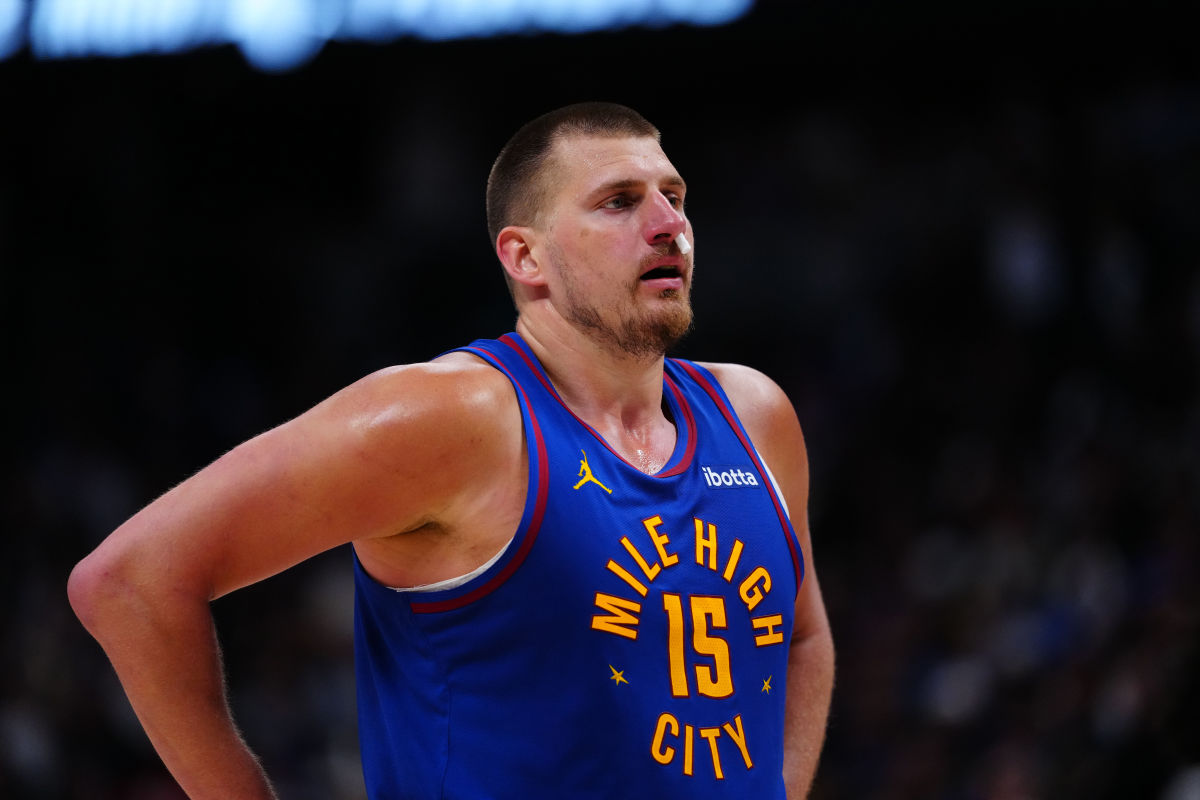
The Oklahoma City Thunder, Cleveland Cavaliers and Boston Celtics combined to win 193 regular-season games. That sort of dominance from three teams at the same time is exceedingly rare. This season was the first since the 2008-09 campaign in which at least three teams won 60 or more games. Their dominance over the field was pronounced. The Thunder earned the second-best net rating in NBA history by outscoring their opponents by 12.7 points per 100 possessions this season. The Celtics (+9.4) and Cavaliers (+9.2) weren’t too far behind. But the fourth-place Timberwolves? Their net rating was “only” +5.
The anticipated postseason script for this spring since no later than Christmas has been those two Eastern Conference powerhouses barreling toward one another in May, with the winner heading to Oklahoma City to take on the inevitable Western Conference champion Thunder in June’s Finals. The only real mysteries were who the Thunder would have to beat to reach the Finals, and who among the Celtics or Cavaliers would join them there.
Well, the second round of the 2025 NBA playoffs started on Sunday, and the Cavaliers lost at home to the Indiana Pacers. The fun continued on Monday, with the Celtics losing in overtime to the New York Knicks and the Thunder blowing a double-digit fourth-quarter lead to the Denver Nuggets. Suddenly, the three best teams in the NBA are all trailing 1-0 and three games away from elimination. All three have lost home-court advantage in their respective series and will need to win at least once on the road to advance.
So that raises an interesting question here: which of the three is in the most danger? If you look at their health, the ways in which they lost Game 1, and the threat posed by their second-round opponent, there’s an obvious answer. So let’s rank all three teams, starting with the safest and moving down to the one in potential crisis.
Mild concern: Boston Celtics
FanDuel odds to win series vs. Knicks: -370 | Odds to win NBA Finals: +210
On April 8, the Celtics traveled to Madison Square Garden to play the Knicks in a game that held no stakes for them. They were already locked into the No. 2 seed in the Eastern Conference. The Knicks, however, were still fighting for the No. 3 seed. Yet Boston still won the game, 119-117, in overtime. That’s what happened when one team had significantly more to play for. When they were both motivated to win, Boston won their first three games by 63 combined points. Last season, Boston swept their first four games and then lost the fifth in April when, again, they had nothing on the line. This has been a mismatch for two years now.
There are obvious strategic reasons for that. The Celtics are fairly aggressive when it comes to hunting defensive mismatches. Jalen Brunson and Karl-Anthony Towns are almost always going to struggle in pick-and-roll defense against the caliber of offensive players the Celtics have. Meanwhile, the Celtics have so many versatile, wing-sized defenders that they can comfortably switch the pick-and-roll between Brunson and Towns if they want to.
All season long, offenses have had success stashing their center on Josh Hart to allow him to provide extra help-defense at the basket. The Pistons did that with Jalen Duren in the first round, and the Celtics will try it with Kristaps Porziņģis as well. Boston will happily live with Hart shooting open 3s if it means containing Brunson and Towns. While Brunson thrived on Monday, Towns struggled. He hasn’t been nearly aggressive enough attacking smaller defenders all postseason, but Boston’s are more fearsome than Detroit’s are. Even if he has mismatches, his 6-of-13 shooting performance Monday won’t scare the Celtics all that much.
The Knicks won Game 1, but they didn’t do it by outplaying the Celtics. They did it by outshooting them. The Knicks made 17 3-pointers on 37 attempts. The Celtics made only 15 3-pointers… but on 60 attempts. Those 45 missed 3s are the most in playoff history by a mile. The old record was set just five days ago by the Minnesota Timberwolves, who missed 40 3s in Game 5 of their first-round win over the Los Angeles Lakers. Now, the Celtics take more 3s than anyone, and they are therefore somewhat subject to the variance that is inherent to that playing style.
But in 82 regular-season games, the Celtics shot 25% or worse from 3-point range only five times. That’s a rate of around one in every 16 games. Meanwhile, the Knicks shot 45.9% or better on 3s in only 11 of their 82 regular-season games. That’s a rate of around one in every seven games. So, the odds of both factors aligning in the same game again this series are around 0.82%. The Knicks got their shooting-variance game, and they still needed overtime to take advantage of it.
But hey, they only had to win in Boston once, right? Now they can just protect home-court advantage and and cruise to the Eastern Conference finals? History says that won’t be so easy. This is the seventh playoff series Tom Thibodeau has coached in New York. He lost at least one home game in five of them, including two home losses in this year’s first-round matchup with the No. 6 seeded Detroit Pistons. As impenetrable as Madison Square Garden may seem when the Knicks are thriving and the building is rocking, recent history suggests the Knicks are beatable there.
If there’s a concern here, it’s health-related. Porziņģis left Game 1 with an illness. If that impacts him moving forward, that’s a problem. Jaylen Brown has dealt with knee issues since late in the season. Jayson Tatum hurt his wrist against Orlando. Jrue Holiday missed games against the Magic with a hamstring injury. The Celtics, at full strength, should roll the Knicks. But they’ve squandered home-court advantage already, and if they’re not at full strength, that makes them vulnerable. The Knicks may not match up especially well with the Celtics, but they’re a No. 3 seed for a reason. This is a talented team with its own championship ambitions, so even if the Celtics are safer than their contemporaries, they are not entirely safe overall.
Medium concern: Oklahoma City Thunder
Odds to win series vs. Nuggets: -320 | Odds to win NBA Finals: +170
The Thunder have a bit more to worry about than the Celtics do. The Nuggets actually arrived in Oklahoma City with a reasonably strong track record against the No. 1 seed. They split the season series this season. Oklahoma City won three of four last season, but one of those wins was by a single point and another did not include Nikola Jokić. Game 1 mostly went as the Thunder would have hoped. There was not wild shooting variance, as both teams were slightly below-average from deep. The Thunder generated twice as many turnovers as the Nuggets. Denver took more free throws, but that’s baked into the physical way the Thunder play. The Thunder took the fifth-fewest free throws in the NBA and allow the fourth-most, so Denver taking five more in Game 1 follows their usual game script. On paper, this mostly looked like a Thunder game.
There was just one core problem: The Nuggets pulled in 20 more rebounds than the Thunder. Now, the Nuggets were the NBA‘s second-best rebounding team during the regular season, and the Thunder ranked 19th, but these are not last season’s tiny, vulnerable Thunder on the glass. Their rebounding rate with Isaiah Hartenstein on the floor was 51.7%, right around Denver’s, and on the rare occasions he and Chet Holmgren played together, they were an absolutely elite rebounding team. For now, we can chalk this up to a one-game sample.
The other real concern here would be Jokić’s 42-point performance on offense. It was the first time the Thunder allowed a single player to score 40 points against them all season. However, it took him 29 shots to get there, and more importantly, he dished out only six assists. The Thunder mostly didn’t double him. There was help available near the basket, sure. There always will be with Denver’s poor shooters on the floor. But they frequently switched his pick-and-rolls, giving him mismatches, and when he did get the ball in the post, the Thunder didn’t scramble to force the ball out of his hands. Even under those circumstances, Jokić scored on four separate putbacks in Game 1 and drew a handful of very preventable fouls. The game plan wasn’t the problem. Jokić just executed at an MVP-level. The goal, seemingly, was to allow him to score his points while stifling the rest of the team.
That’s a reasonable strategy against Denver right now. Their best 3-point shooter, Michael Porter Jr., is playing through a shoulder injury and struggling mightily at the moment. He scored only two points in Game 1. Russell Westbrook scored 18, but he’s as feast or famine as it gets. He was held to single digits in one-third of his regular-season games (25 of 75), and he’s inevitably going to have a few bad games in which the jumpers don’t fall and the turnovers are plentiful. Oklahoma City can live with him playing aggressively. Jamal Murray scored 21 points, but needed 16 shots to do it. The Thunder might need to pay Aaron Gordon a bit more attention from deep. He’s made his shots this year and the Clippers got burned for ignoring him. But given Denver’s limitations at the moment, the idea of making the role players score without getting easy passes from Jokić makes sense. There’s no reason to panic over what happened in Game 1.
The Thunder are still the far healthier team. They’re also the fresher one. The Nuggets just finished a seven-game series on Saturday. The toll of that Clippers series is going to become more apparent as the series progresses. Denver has had to lean on Westbrook and its starters all season. The Thunder have won so consistently by such wide margins that they’ve been able to limit the workloads of just about everyone on their team. Now we’ll see what it looks like when they’re going all out. They’ve won at least one regular-season game in Denver four years in a row, so Ball Arena isn’t exactly a house of horrors for them. Battling the best player in the world will always be somewhat concerning, but the Thunder still have a pretty meaningful advantage here.
Severe concern: Cleveland Cavaliers
Odds to win series vs. Pacers: -230 | Odds to win NBA Finals: +500
There are a lot of reasons Cleveland is in the most danger right now, but health is the biggest. Darius Garland hasn’t played since Game 2 of Cleveland’s first-round series against Miami because of a toe sprain. Evan Mobley (ankle) and De’Andre Hunter (thumb) are both questionable for Game 2 because of injuries suffered in the Game 1 loss to the Indiana Pacers. These are minor injuries in the grand scheme of things. They are potentially lethal in the context of this series. The Cavaliers are already down one game. Even if Garland, Hunter and Mobley are ready for Game 3, a Game 2 loss means that the Cavs would need to win four out of the last five games of the series, including at least two on the road, to stay alive.
That is no given against Indiana. The Thunder, Celtics and Cavs have been the three best teams of the season, but since Jan. 1, the Pacers haven’t been far behind. Case in point: Cleveland went 35-14 after the calendar flipped, and Indiana went 34-14. Cleveland’s net rating was higher, but Indiana, amazingly, was better on defense. Despite Indiana’s reputation as an offense-centric roster, they’ve been a top-10 defense for four months now.
Their offense hasn’t suffered for it, especially now that Tyrese Haliburton looks like he’s back to something resembling full strength. A hamstring injury ruined the end of last season for him and it seemingly stretched into the beginning of this season as well. But since Jan. 1, only Trae Young and Nikola Jokić have generated more points per game off of assists than he has. He’s made over 43% of his 3-pointers since then, and he’s even starting to attack the basket a bit more when he sees mismatches on the perimeter. Early last season, he had a potential MVP case. He’s not quite back there yet, but he’s much, much closer than he was early in the season, and if Cleveland’s defense has a vulnerable spot, it’s in the backcourt.
The Knicks and Nuggets are pretty limited when it comes to feasible adjustments because they trust so few players. Rick Carlisle used 11 players on Sunday. Most of those players were a big part of last year’s run to the Eastern Conference finals, which went far better than most remember. Yes, injuries to opponents helped them get there, but Game 1 against Boston went to overtime and Games 3 and 4, which Haliburton missed, were decided by a single possession. They have players capable of scaling up or down depending on the specific needs of a matchup or individual game.
One thing the Cavs can hang onto going into Game 2 is the same wild shooting variance that doomed the Celtics. Indiana shot 13-of-25 on wide-open 3s while Cleveland shot 3-of-11. Those percentages are going to be closer in Game 2… but the volume should be concerning. The Celtics generated clean looks from 3 and missed them. The Cavaliers? Not so much. Garland’s absence played a role in that, but so did Indiana’s defense. That’s been a point of emphasis for the Pacers for two years. They allowed the eighth-fewest wide-open 3s this season and the fewest comfortably a season ago. Cleveland’s offense is predicated on breaking down an opposing defense to generate clean 3s. That’s not going to be a given against the Pacers, especially if they aren’t healthy.
That’s the crux of this. At full strength, the Cavaliers are probably the slightly better team. We just don’t know if full-strength is going to be plausible in this series, and if it isn’t, these are two teams that have played at a somewhat similar level for four months now. One of those teams is healthy and has home-court advantage and it isn’t Cleveland. That makes Game 2 the single most important game of the playoffs thus far when it comes to actually deciding the 2025 champion. The Celtics and Thunder will probably be favored until or unless they lose a third game. But this thing could get away from Cleveland quickly. The Cavaliers are at DEFCON 2 right now, and a bad quarter or two on Tuesday takes them down to DEFCON 1.





